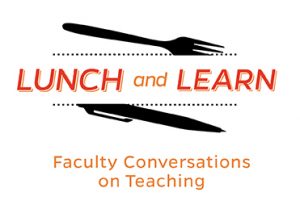 On Wednesday, April 17, the Center for Educational Resources (CER) hosted the final Lunch and Learn for the 2018-2019 academic year: Strategies to Minimize Cheating (A Faculty Brainstorming Session). As the title suggests, the format of this event was slightly different than past Lunch and Learns. Faculty attendees openly discussed their experiences with cheating as well as possible solutions to the problem. The conversation was moderated by James Spicer, Professor, Materials Science and Engineering, and Dana Broadnax, Director of Student Conduct.
On Wednesday, April 17, the Center for Educational Resources (CER) hosted the final Lunch and Learn for the 2018-2019 academic year: Strategies to Minimize Cheating (A Faculty Brainstorming Session). As the title suggests, the format of this event was slightly different than past Lunch and Learns. Faculty attendees openly discussed their experiences with cheating as well as possible solutions to the problem. The conversation was moderated by James Spicer, Professor, Materials Science and Engineering, and Dana Broadnax, Director of Student Conduct.
The discussion began with attendees sharing examples of academic misconduct they identified. The results included: copying homework, problem solutions, and lab reports; using other students’ clickers; working together on take-home exams; plagiarizing material from Wikipedia (or other sites); and using online solution guides (such as chegg.com, coursehero.com, etc.).
Broadnax presented data from the Office of the Dean of Student Life regarding the numbers of cheating incidents per school, types of violations, and outcomes. She stressed to faculty members how important it is to report incidents to help her staff identify patterns and repeat offenders. If it’s a student’s first offense, faculty are allowed to determine outcomes that do not result in failure of the course, transcript notation, or change to student status. Options include: assigning a zero to the assessment, offering a retake of the assessment, lowering the course grade, or giving a formal warning. A student’s second or subsequent offense must be adjudicated by a hearing panel (Section D – https://studentaffairs.jhu.edu/policies-guidelines/undergrad-ethics/).
Some faculty shared their reluctance to report misconduct because of the time required to submit a report. Someone else remarked that when reporting, she felt like a prosecutor. As a longtime ethics board member, Spicer acknowledged the burdens of reporting but stressed the importance of reporting incidents. He also shared that faculty do not act as prosecutors at a hearing. They only provide evidence for the hearing panel to consider. Broadnax agreed and expressed interest in finding ways to help make the process easier for faculty. She encouraged faculty to share more of their experiences with her.
The discussion continued with faculty sharing ideas and strategies they’ve used to help reduce incidents of cheating. A summary follows:
- Do not assume that students know what is considered cheating. Communicate clearly what is acceptable/not acceptable for group work, independent work, etc. Clearly state on your syllabus or assignment instructions what is considered a violation.
- Let students know that you are serious about this issue. Some faculty reported their first assignment of the semester requires students to review the ethics board website and answer questions. If you serve or have served on the ethics board, let students know.
- Include an ethics statement at the beginning of assignment instructions rather than at the end. Research suggests that signing ethics statements placed at the beginning of tax forms rather than at the end reduces dishonest reporting.
- Do not let ‘low levels’ of dishonesty go without following University protocol – small infractions may lead to more serious ones. The message needs to be that no level of dishonesty is acceptable.
- Create multiple opportunities for students to submit writing samples (example: submit weekly class notes to Blackboard) so you can get to know their writing styles and recognize possible instances of plagiarism.
- Plagiarism detection software, such as Turnitin, can be used to flag possible misconduct, but can also be used as an instructional tool to help students recognize when they are unintentionally plagiarizing.
- Emphasize the point of doing assignments: to learn new material and gain valuable critical thinking skills. Take the time to personally discuss assignments and paper topics with students so they know you are taking their work seriously.
- If using clickers, send a TA to the back of the classroom to monitor clicker usage. Pay close attention to attendance so you can recognize if a clicker score appears for an absent student.
- Ban the use of electronic devices during exams if possible. Be aware that Apple Watches can be consulted.
- Create and hand out multiple versions of exams, but don’t tell students there are different versions. Try not to re-use exam questions.
- Check restrooms before or during exams to make sure information is not posted.
- Ask students to move to different seats (such as the front row) if you suspect they are cheating during an exam. If a student becomes defensive, tell him/her that you don’t know for sure whether or not cheating has occurred, but that you would like him/her to move anyway.
- Make your Blackboard site ‘unavailable’ during exams; turn it back on after everyone has completed the exam.
- To discourage students from faking illness on exam days, only offer make-ups as oral exams. One faculty member shared this policy significantly reduced the number of make-ups due to illness in his class.
Several faculty noted the high-stress culture among JHU students and how it may play a part in driving them to cheat. Many agreed that in order to resolve this, we need to create an environment where students don’t feel the pressure to cheat. One suggestion was to avoid curving grades in a way that puts students in competition with each other. Another suggestion was to offer more pass/fail classes. This was met with some resistance as faculty considered the rigor required by courses students need to get into medical school. Yet another suggestion was to encourage students to consult with their instructor if they feel the temptation to cheat. The instructor can help address the problem by considering different ways of handling the situation, including offering alternative assessments when appropriate. Broadnax acknowledged the stress, pressure, and competition among students, but also noted that these are not excuses to cheat: “Our students are better served by learning to best navigate those factors and still maintain a standard of excellence.”
Amy Brusini, Senior Instructional Designer
Center for Educational Resources
Image Source: Lunch and Learn Logo

